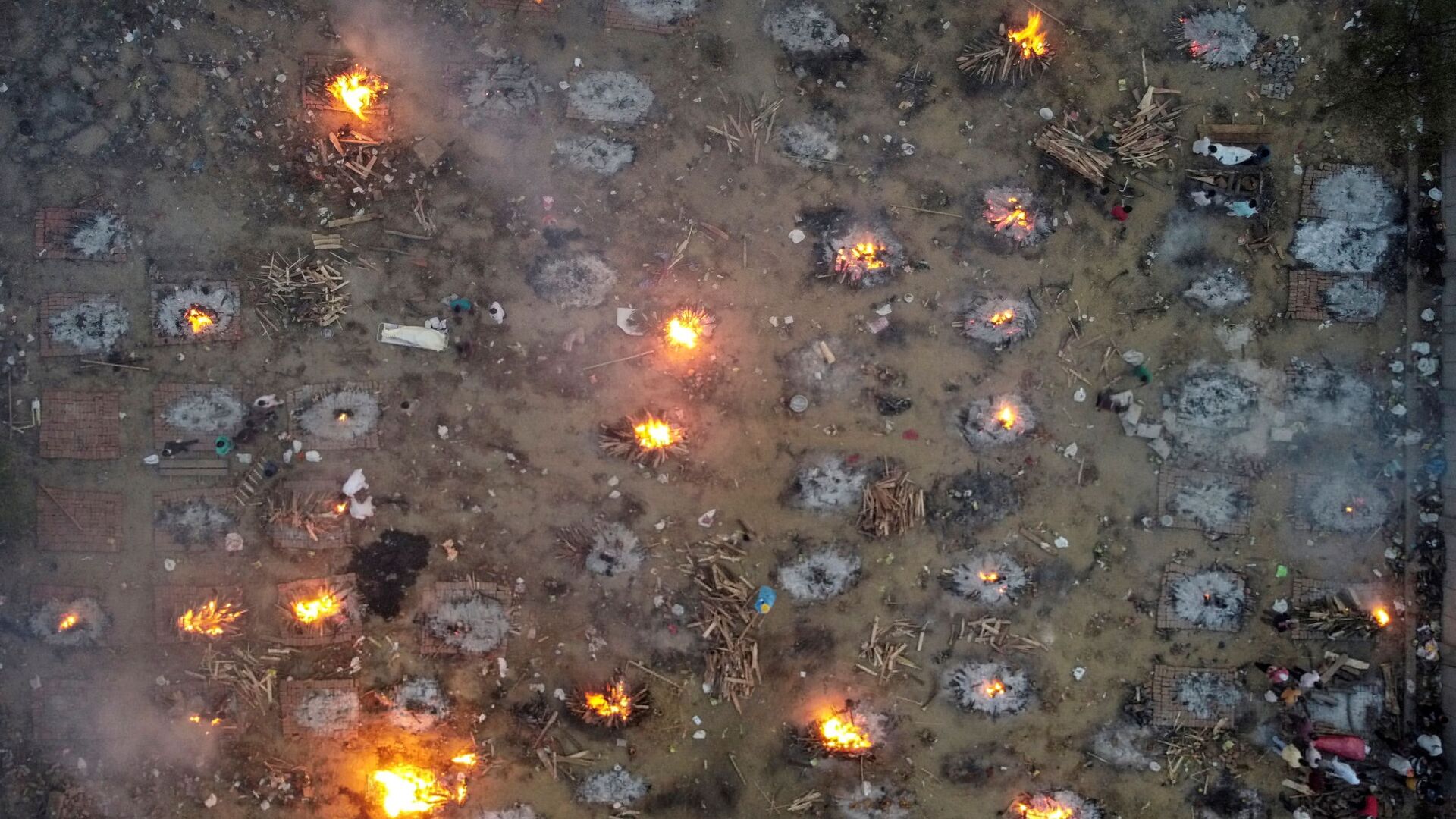Earlier this month, thousands of dead bodies were found floating in the River Ganges or buried along its banks in the Indian states of Bihar and Uttar Pradesh. These bodies were believed to be of people who died of COVID-19.
In seven days, more than 2,000 such dead bodies were recovered along 1,100km of the river bank. However, it is not yet clear who dumped these bodies into the river or turned the banks into a mass grave.
However, as such incidents continue unabated, the Uttar Pradesh government has called in the State Disaster Response Force (SDRF) and personnel from the Provincial Armed Constabulary to patrol near all rivers in the state.
Uttar Pradesh's state chief Yogi Adityanath conceded that people have been burying the dead in shallow sandy graves along the riverbank in the state since the cremation grounds were overcrowded.
Dumping a corpse in the river is not new practice in India: a priest at Nigambodh Ghat in Delhi, who does not wish to be named, told Sputnik that "a few [types of] corpse are considered unfit for cremation - for instance, those who have died of a snakebite, an infant or young child, or those who have died of skin diseases such as chickenpox or smallpox.
"In such situations, we ask the family or friends to wrap the bodies in banana leaves and a cotton cloth and put the corpse directly into the river," the priest added.
In 1988, the Indian government banned this centuries-old custom of immersing shrouded bodies in the holy water of the Ganges.
"But, putting the law into practice took almost 15 years. It was only by the beginning of this century, this law came into practice," Vinod Kantre, a professor of environmental engineering at the Indian Institute of Technology at Kanpur, Uttar Pradesh, told Sputnik.
"Although there is no report to say that dead bodies infect the river water in any way or can cause any direct harm to fish or birds, many other problems can arise," Kantre said.
"If a body gets stuck on any stone or at the riverbank, it could become the breeding ground for bacteria and fungus [and] if the person died of some disease, the body may be carrying some infectious virus, but we lack data in the case of COVID-19," he added.
Cautioning about corpses found in the river, a physician, Dr Vighnesh Naidu Y, told Sputnik: "India has COVID-19 specific crematory guidelines in place, as we are already aware that despite being dead, the virus is very much present in the body's fluids, and the standard advisory already deals with this issue. It must be ensured that the loved ones of any COVID-19 patient who has died should not make physical contact with the body, though viewing from a distance is allowed. Also deep burial and cremation is permitted with a small number of family present. It is also mentioned in the guidelines that it is safe to handle ash for rituals. But of course, these are being followed for COVID detected patients. But for the unreported patients, especially in rural India, a more vigilant and humane approach needs to be in place."
States such as Jharkhand, West Bengal, Bihar and Uttar Pradesh — which comprise roughly 40 percent of the country's population, have dismal healthcare systems. In the case of Abhay Ram, a resident of Jharkhand who died at home with COVID-19 symptoms this month, the family was unable to find support from locals to have the body cremated. A few days later, a relation of Ram died with similar symptoms and this time, not even family joined the funeral. In large parts of rural India, in which 65 percent of the population is based, people with COVID-19 have found themselves outcasts among their neighbours.
“We failed to buy wood for cremation as prices went up in recent days. We did not want to immerse the body of my brother in the river but we had no choice,” Girish Verma, a resident of Prayagraj in Uttar Pradesh, told Sputnik.
The Uttar Pradesh government has announced a grant of INR 5,000 ($70) to those families who cannot afford cremation and urged people "not to disregard the corpse by throwing it in the river." However, media reports suggest that bodies are still immersed in the state.
The problem is not confined to Uttar Pradesh: on Wednesday, another incident came to light from India's southern state of Tamil Nadu when COVID-19 bodies were buried near a drinking-water pond.
— SHIBA (@shibasahu2012) May 19, 2021
"There are many ifs and buts regarding the cremation of COVID-19 bodies. The government is changing its guideline every day, and people can't keep up. What's more, they are scared. More than the policy, the government need to come forward and take responsibility of the bodies which families members do not wish to cremate," Sunil Kumar Aledia, a Delhi-based activist, told Sputnik.
Aledia added that he has cremated more than 100 bodies in Delhi, mostly unidentified.





